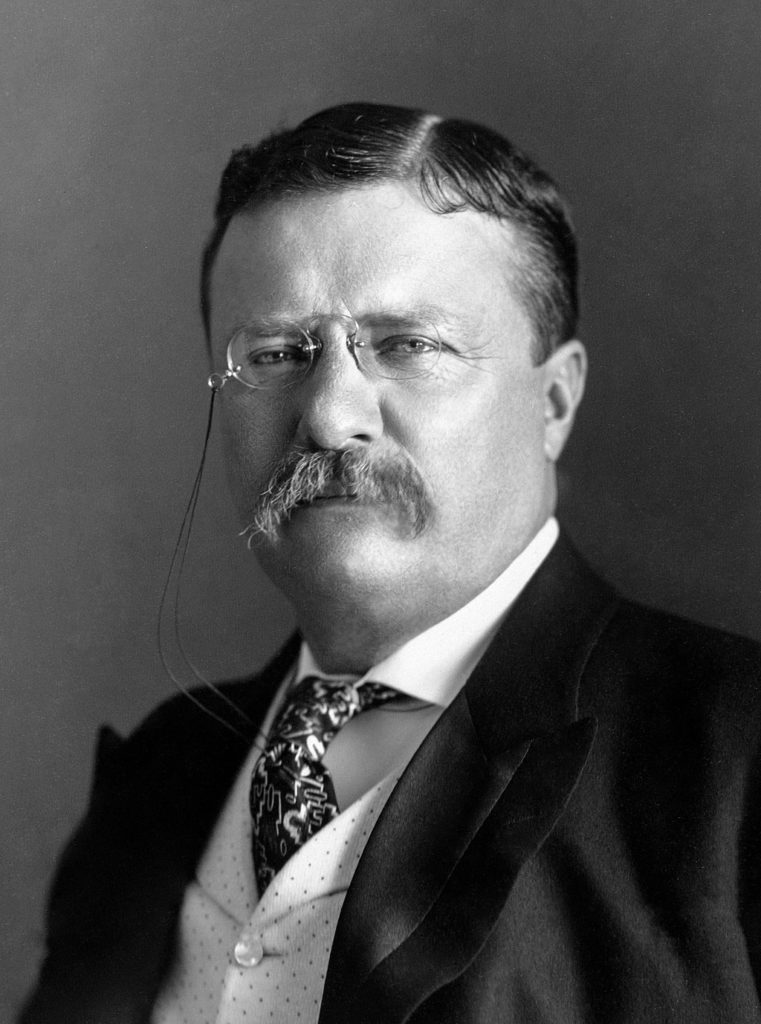
Theodore Roosevelt Jr. was born on October 27, 1858 in Manhattan, New York City. Although he suffered from asthma in early life, he was able to build robust health through a physically active childhood. During those early years, he was home-schooled, yet forays into outdoor exploration fostered an intense interest in zoology and at age 9, he wrote a paper titled “The Natural History of Insects,” in which he recorded his observations of those tiny creatures. Theodore’s father, a prominent “mover and shaker” in New York society, was a role model whom Teddy (as he was affectionately known) later described as “the best man I ever knew…he would not tolerate in us children selfishness or cruelty, idleness, cowardice, or untruthfulness.” While on a camping trip, during his adolescence, Teddy was bullied by two older boys–an incident that prompted him to involve himself in boxing lessons. This experience was to serve him well in the years to come, enabling him to understand the bully mentality and deal strongly with aggressive regimes.
When Teddy was accepted at Harvard in September 1876 his father advised him, “Take care of your morals first, your health next, and finally your studies.” Following his father’s advice, he poured himself into his studies, while also participating in school sports, including rowing and intramural boxing and a stint as an editor of The Harvard Advocate. During these undergraduate years, he also conducted in-depth research into the tactics of the U.S. Navy during the War of 1812–an undertaking that would culminate in 1882 in the seminal publication The Naval War of 1812. This book, praised for its scholarship and insightful analysis, remains a classic to this day.
In 1880, Theodore graduated Phi Beta Kappa with an A.B. magna cum laude, but upon graduation, abandoned his original plan to study science and enrolled in Columbia Law School. However, his interest in law would diminish as he became increasingly involved in politics and the Republican Party. In his efforts to fight corruption he became a member of the New York State Assembly in 1882, 1883, and 1884 and his reputation as an honest politician grew.
On February 12, 1884, the former New York socialite Alice Hathaway Lee, whom Roosevelt had married in 1880, gave birth to their daughter, Alice Lee. On Valentine’s Day just 2 days after Alice’s birth, Theodore was summoned to the family home where his mother had just died of typhoid fever. Then 11 hours later, his wife, Alice died from a kidney ailment known as Bright’s disease. With his wife and mother’s almost simultaneous deaths, Teddy was devastated, writing, “The light has gone out of my life.” Struggling to deal with his profound grief, Roosevelt abandoned politics and placed Alice Lee in the care of his sister, Bamie. Near the end of 1884, Roosevelt traveled to the Dakotas where he established a cattle ranch and worked as a Sheriff. When his herd was destroyed by a blizzard in the winter of 1886–87, Roosevelt returned to New York and took custody of Alice Lee.
In 1899, shortly after his return from the Spanish-American War, where he organized the famous “Rough Riders,” Roosevelt was elected as the 33rd Governor of New York. In the 1900 Presidential election, he became Vice President to President William McKinley. When McKinley was assassinated on September 14. 1901, Theodore Roosevelt became the 26th President of the United States. He was reelected in 1904 and became a two-term President.
Theodore Roosevelt was, above all, a man of character. He was one of the few people in government who fought corruption, while others in the political domain came to feed at the trough. His early experiences with bullies helped him become strong in the face of aggressive adversaries. This enabled him to enforce the Monroe Doctrine and promote America as a world power. His famous adage, “Walk softly and carry a big stick,” is a reminder to all of us that weakness invites aggression, and we can never allow ourselves to become so undisciplined that we hope to negotiate our freedoms from a position of weakness.
When he died in 1919, polls of historians and political scientists ranked him as one of the greatest presidents in American history. We are all beneficiaries of his insight and his character.
